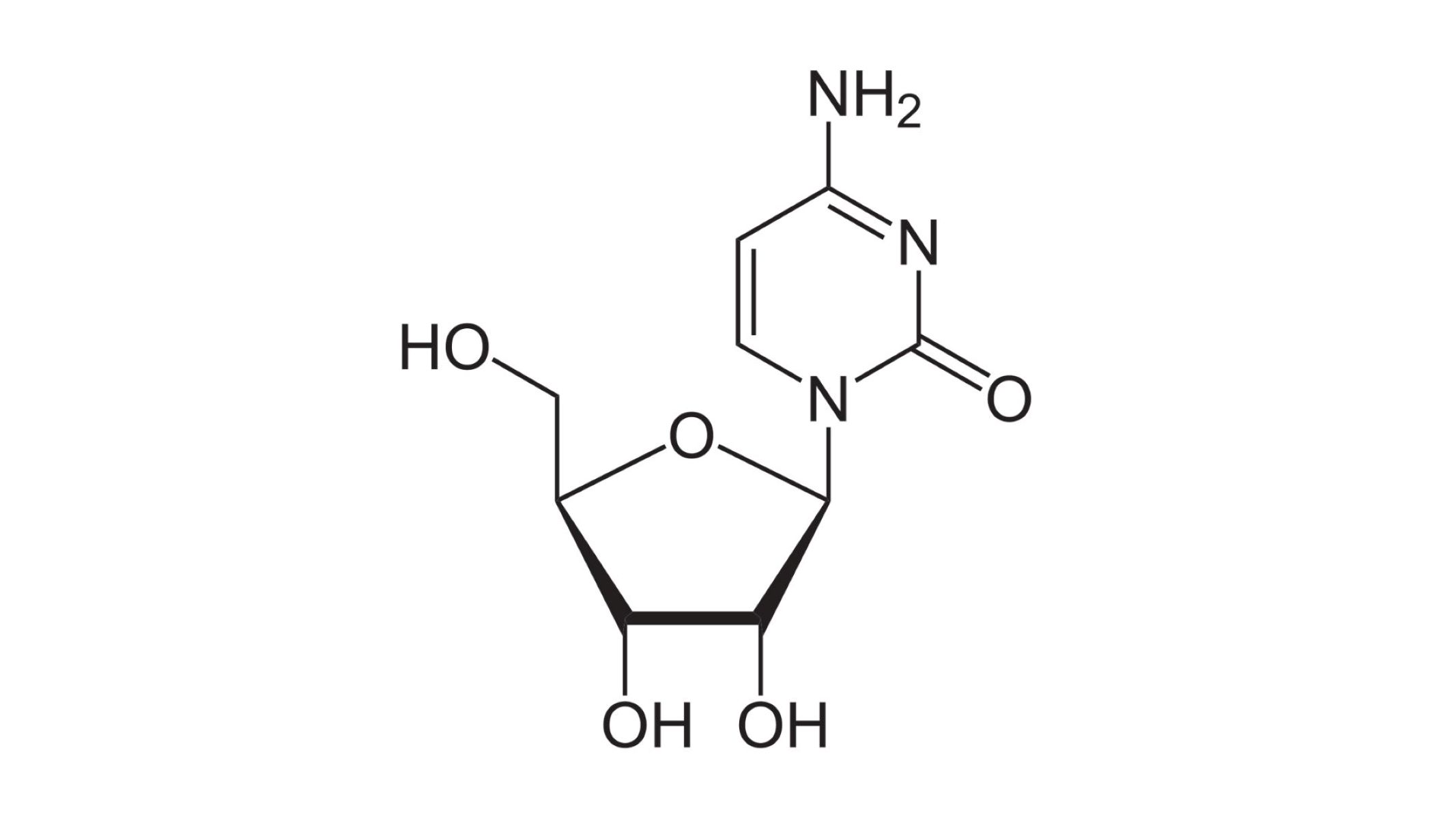
Cytidine is a fascinating molecule that plays a crucial role in biology. Found in RNA, it helps encode genetic information and is vital for various cellular processes. But what exactly is cytidine, and why is it so important? Cytidine is a nucleoside composed of cytosine attached to a ribose sugar. This small but mighty molecule is involved in the synthesis of RNA and DNA, impacting everything from protein production to cell division. Understanding cytidine can provide insights into genetics, medicine, and even the development of new therapies. Ready to dive into 50 intriguing facts about this essential component of life? Let's get started!
Key Takeaways:
- Cytidine is a vital molecule in RNA and has diverse roles in biology, medicine, and nutrition. It's found in foods, breast milk, and supplements, supporting brain health and playing a key role in gene expression and therapy research.
- Cytidine's potential in medicine and biotechnology is exciting, with possibilities for new treatments for neurodegenerative diseases, improved antiviral drugs, and targeted cancer therapies. Its versatility and importance in genetic systems continue to inspire innovative research and applications.
What is Cytidine?
Cytidine is a nucleoside molecule that plays a crucial role in the structure of RNA. It's composed of a cytosine base attached to a ribose sugar. Here are some fascinating facts about cytidine:
- Cytidine is one of the four main nucleosides in RNA, alongside adenosine, guanosine, and uridine.
- It is essential for the coding, decoding, regulation, and expression of genes.
- Cytidine can be phosphorylated to form cytidine triphosphate (CTP), which is vital for RNA synthesis.
- It is involved in the synthesis of phospholipids, which are crucial for cell membrane integrity.
- Cytidine can be converted into uridine through deamination, a process that removes an amino group.
Biological Functions of Cytidine
Cytidine's role in biological systems is multifaceted. It is involved in various biochemical pathways and cellular processes.
- Cytidine triphosphate (CTP) acts as a coenzyme in lipid metabolism.
- It is a precursor for the synthesis of cytidine diphosphate-diacylglycerol (CDP-DAG), a key intermediate in phospholipid biosynthesis.
- Cytidine is crucial for the proper functioning of the nervous system.
- It helps in the formation of myelin, the protective sheath around nerve fibers.
- Cytidine derivatives are used in the treatment of certain neurological disorders.
Cytidine in Medicine
Cytidine and its derivatives have significant medical applications. They are used in treatments for various diseases and conditions.
- Cytidine analogs are used as antiviral and anticancer agents.
- Azacitidine, a cytidine analog, is used to treat myelodysplastic syndromes.
- Cytidine supplements are sometimes used to improve cognitive function.
- It has potential therapeutic effects in Alzheimer's disease.
- Cytidine can enhance the efficacy of certain chemotherapy drugs.
Cytidine in Research
Cytidine is a subject of extensive research due to its importance in cellular processes and potential therapeutic applications.
- Researchers study cytidine to understand its role in gene expression regulation.
- It is used in studies related to RNA interference (RNAi) mechanisms.
- Cytidine analogs are used to investigate DNA methylation patterns.
- It helps in understanding the mechanisms of RNA editing.
- Cytidine is used in the development of new antiviral therapies.
Chemical Properties of Cytidine
Cytidine's chemical properties make it a unique and versatile molecule in biochemistry.
- Cytidine has a molecular formula of C9H13N3O5.
- It has a molecular weight of 243.22 g/mol.
- Cytidine is soluble in water and slightly soluble in ethanol.
- It has a melting point of 210-212°C.
- Cytidine can form hydrogen bonds, which are crucial for its interaction with other molecules.
Cytidine in Nutrition
Cytidine is also important in the context of nutrition and dietary supplements.
- Cytidine is found in foods like meat, fish, and dairy products.
- It is a component of breast milk, providing essential nutrients to infants.
- Cytidine supplements are available for those who need additional intake.
- It can support brain health and cognitive function.
- Cytidine is often included in nootropic supplements for its potential cognitive benefits.
Cytidine in Biotechnology
Cytidine's applications extend to biotechnology, where it is used in various innovative ways.
- Cytidine is used in the synthesis of RNA-based vaccines.
- It plays a role in the development of gene therapy techniques.
- Cytidine analogs are used in the production of synthetic nucleic acids.
- It is involved in the creation of CRISPR-Cas9 gene editing tools.
- Cytidine is used in the development of diagnostic assays for genetic diseases.
Cytidine and Evolution
Cytidine has played a significant role in the evolution of life on Earth.
- Cytidine is believed to have been present in the earliest forms of life.
- It is a key component of the RNA world hypothesis, which suggests that RNA molecules were the precursors to current life forms.
- Cytidine's ability to form base pairs with guanine is crucial for the stability of RNA structures.
- It has contributed to the evolution of complex genetic systems.
- Cytidine's role in RNA synthesis is fundamental to the continuity of genetic information.
Interesting Facts about Cytidine
Here are some more intriguing facts about cytidine that highlight its importance and versatility.
- Cytidine can be synthesized in the laboratory through chemical methods.
- It is used in the study of epigenetics, which explores changes in gene expression without altering the DNA sequence.
- Cytidine analogs are used as molecular probes in biochemical research.
- It has applications in the development of personalized medicine.
- Cytidine is a subject of interest in the study of aging and longevity.
Future Prospects of Cytidine
The future of cytidine research and applications looks promising, with potential breakthroughs on the horizon.
- Cytidine may play a role in the development of new treatments for neurodegenerative diseases.
- It could be used in the creation of more effective antiviral drugs.
- Cytidine analogs might be developed as targeted cancer therapies.
- Research on cytidine could lead to advancements in regenerative medicine.
- The study of cytidine and its derivatives continues to open new avenues in biotechnology and medicine.
Final Thoughts on Cytidine
Cytidine, a key player in RNA and DNA, holds immense importance in biology. This nucleoside, composed of cytosine and ribose, is vital for cellular processes. It’s found in foods like meat and fish, contributing to brain health and cognitive function. Cytidine also plays a role in treating neurological disorders and enhancing memory. Its derivatives, such as cytidine triphosphate (CTP), are crucial for lipid metabolism and cell membrane formation. Understanding cytidine’s functions helps in grasping the complexities of genetic information transfer and cellular energy production. From its role in RNA synthesis to its therapeutic potential, cytidine proves to be a fascinating molecule. Knowing these facts enriches our appreciation of the intricate workings of life at the molecular level. Keep exploring the wonders of biochemistry, and you’ll uncover even more intriguing details about molecules like cytidine.
Frequently Asked Questions
Was this page helpful?
Our commitment to delivering trustworthy and engaging content is at the heart of what we do. Each fact on our site is contributed by real users like you, bringing a wealth of diverse insights and information. To ensure the highest standards of accuracy and reliability, our dedicated editors meticulously review each submission. This process guarantees that the facts we share are not only fascinating but also credible. Trust in our commitment to quality and authenticity as you explore and learn with us.


